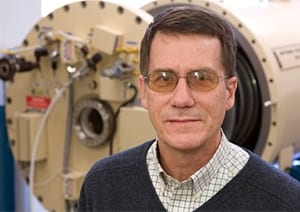Bill Jenkins Wins Prestigious Ewing Medal
Bill Jenkins, WHOI senior scientist in Marine Chemistry and Geochemistry and director of the National Ocean Sciences Accelerator Mass Spectrometry Facility (NOSAMS), was awarded the American Geophysical Union’s (AGU) 2010 Ewing Medal at the AGU’s Fall Meeting in December in San Francisco. The Ewing Medal is awarded to an individual geoscientist “for significant original contributions to the scientific understanding of the processes in the ocean; for the advancement of oceanographic engineering, technology, and instrumentation; and for outstanding service to the marine sciences.” The medal is named in honor of Maurice Ewing, who made significant contributions to deep-sea exploration.
Jenkins was cited for a “research record… remarkable for its exceptional quality, depth and diversity, with major scientific findings spanning solid-earth geochemistry and physical, chemical and biological oceanography. Few scientists can claim such substantial impact and recognition across so many different aspects of geoscience. [Jenkins] is the rare scientist who designs and builds new instruments, performs superb laboratory and field measurements, and generates novel data analysis and theoretical advances.”
Jenkins is perhaps best known for pioneering the ocean tritium-3He dating method. In the early 1970s, he developed mass spectrometric methods for measuring seawater tritium and its decay product 3He, and was the first to envision how coupled tritium-3He measurements constrain the ventilation age for water parcels.
"I am deeply honored to receive the Ewing Medal,” Jenkins said. “Many of us are motivated by the belief that what we do has some intrinsic value to society, but receiving recognition from our peers is an unanticipated and unparalleled joy, for it is our peers who understand the significance and challenges of our endeavors. "
The Ewing Medal was established in 1974 and is jointly sponsored with the United States Navy.
The Woods Hole Oceanographic Institution is a private, independent organization in Falmouth, Mass., dedicated to marine research, engineering, and higher education. Established in 1930 on a recommendation from the National Academy of Sciences, its primary mission is to understand the ocean and its interaction with the Earth as a whole, and to communicate a basic understanding of the ocean's role in the changing global environment.

